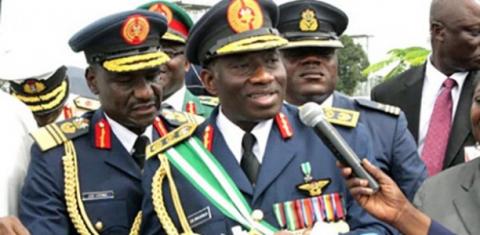Forces behind shake-up in military

BY PHILIP NWOSU
With the sudden appointment of new service chiefs, political pundits are of the belief that President Goodluck Jonathan has commenced repositioning for his 2015 presidential re-election bid.
There had been a lot of criticism against the president and his style, with many calling on him to leave office after 2015. Those calling for the president’s head said he had not done well in governance, pointing to the Boko Haram menace as one of the many areas the regime has failed to make progress.
Some also accused the president of being sectional, labelling him North hater.
However, with this appointment, President Jonathan seems to have killed two birds with one stone, first wooing the North and secondly confronting Boko Haram headlong.
The appointment, many believe, will, in a way, move the president closer to the people of North who, many said, have been bitter following the death of President Umar Musa Yar’Adua in office and the removal of Lieutenant General Abdulrahman Dambazzau as Chief of Army Staff.
It is believed that in order to convince northerners that they are not being schemed out, the appointment of an Air Force officer from the North eastern part of the country to head the military is a step in the right direction.
Apart from that, it is believed that there is need to sustain the fight against the Boko Haram insurgents, hence the appointment of an officer, whose area is also an enclave for the terrorists, to lead the battle.
Experts are of the view that the appointment of the new service chiefs may have been informed by Jonathan’s disappointment with the failure of the erstwhile military commanders to root out the Boko Haram insurgency. In making Badeh, a native of Adamawa, the new Defence Chief, Jonathan seems to have decided to use a “home boy” to fight the menace.
However, if the CDS, an Air Force officer, is from the North, others believe that it will be right for Jonathan to also protect his interest in the system, with the appointment of a key military commander from his side of the country. Certainly, these pundits points to the appointment of Major General Kenneth Minimah, former General Officer Commanding (GOC), 81 Division and immediate past Commandant of Infantry Centre in Jaji Kaduna State, as the new Chief of Army Staff, as one of such moves to protect the president’s interest.
General Minimah will be taking over from the Lieutenant General Onyebaor Ihejirika as the 27th Chief of Army Staff, with enormous responsibility of ensuring stability of the polity and sustaining the onslaught against insurgents from the North eastern part of the country.
Before now, General Minimah, who had held many appointments in the Nigerian Army, is being pointed to, as the probably, choice for the replacement of the General Ihejirika, in the event of a shake up in the military.
With this belief, the appointment was not as surprise to many, as they are of the view that President Jonathan will not do anything less but give the command of the 126,000 strongman army to a trusted officer, who is also seen to be loyal and ready to carry out his directive.
General Minimah was born in Opobo Town, in Opobo/Nkoro Local Government Area of Rivers State and was granted Regular Combatant Commission on December 18, 1981 in the rank of second lieutenant with seniority in the rank effective January 3, 1979.
A core infantry officer, who, apart from being the General Officer Commanding one of the strategic divisions of the force had worked at the Infantry Corps Centre in Jaji twice, first as a Deputy Commandant and Secondly as the Commandant.
General Minimah, according to experts, is the man President Jonathan needs now, especially with the kind of opposition he was getting from the northern and western parts of the country and the inability of the insurgents to lay down their arms.
With the exit of Ihejirika, according to many, no better candidate but the new Chief of Army Staff is fit for the job, if President Jonathan wants to succeed.
However, whether right or wrong, jubilation greeted the appointment of the services chiefs, especially in military circles. In the Navy, for instance, many rejoiced while many were skeptical about what the future will be under the new regime.
Indeed, the jubilation, according to most personnel who spoke on condition of anonymity, was not unconnected with recent happening in the service, which may not have gone well with some members of the force.
Source: Sun
